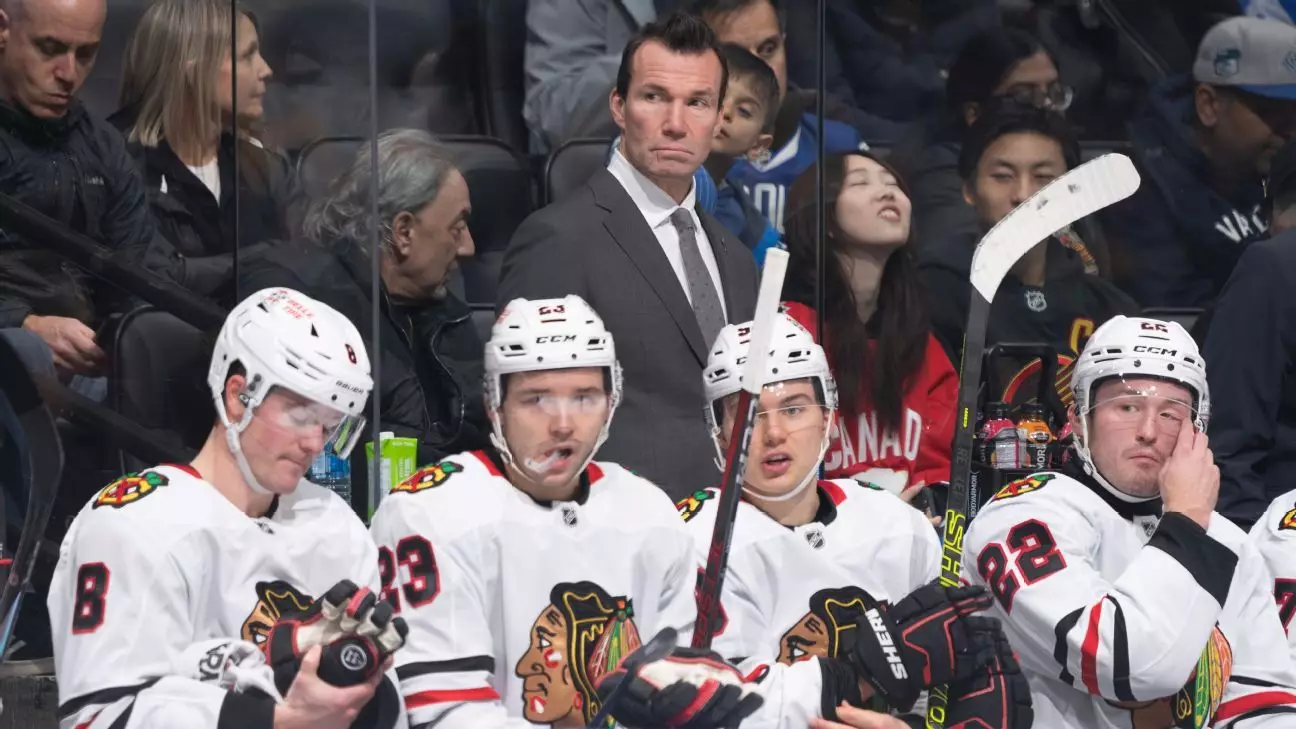On Thursday, the Chicago Blackhawks ignited a significant shift in their restructuring plans by firing head coach Luke Richardson after a dismal three-season tenure. In a league where performance is scrutinized relentlessly, the Blackhawks’ move is emblematic of a franchise still grappling with the ramifications of a prolonged rebuild. Anders Sorensen, previously the head coach of the AHL’s Rockford IceHogs, has been named the interim head coach effective immediately, stepping into a trying situation that has seen the Chicago team at its lowest competitive ebb.
Richardson, 55 years old, took the reins in 2022 with a record of 57 wins, 118 losses, and 15 overtime losses. His dismissal unfolded amidst a disappointing start to the current season, where the Blackhawks sit at the bottom of the NHL standings with a woeful record of 8-16-2 after 26 games. The season’s trajectory not only underscores the difficulty of Richardson’s task but also reflects the broader struggles the Blackhawks have endured throughout the rebuilding process. General manager Kyle Davidson’s comments indicating a need for change resonate with frustration, as he acknowledged that the team’s performance did not align with expectations.
Under Richardson’s guidance, the Blackhawks found themselves not only failing to climb in the standings but also losing ground in critical areas of the game. They ranked second to last in offensive production, averaging merely 2.42 goals per game, and were tied for 21st in defense, allowing an average of 3.15 goals against each outing. This lack of offensive dynamism had a pronounced effect on the potential of young superstar Connor Bedard, who, despite being hailed as the franchise’s future, has struggled to find his footing with just five goals to his name.
Criticism of Richardson’s strategy has been pointed, particularly his decision to alter Bedard’s position on the ice. Moving a natural center to the wing, Richardson attempted to bolster a lineup bereft of scoring options. The urgency to solidify the defensive structure came at the expense of creativity and aggressiveness on offense, resulting in a stagnant attack. As Bedard himself noted, infusing positivity in constant losses became increasingly arduous. His comments reiterate a fundamental truth in competitive sports: players want to win, not merely stay competitive in games they cannot win.
In taking over as interim head coach, Sorensen faces the daunting challenge of not only rejuvenating a lackluster roster but also instilling a stronger sense of direction for the franchise’s rebuilding phase. His previous success with the IceHogs, where he posted a commendable record of 117 wins in 229 AHL games, serves as a partially reassuring backdrop. Players in Rockford have lauded Sorensen for his communication and teaching skills, which could be pivotal in turning the Blackhawks’ season around.
However, the stakes are high. A simple interim appointment may evolve into a long-term solution should Sorensen demonstrate the ability to connect with the young talent the franchise is counting on. Top prospects like Frank Nazar, Kevin Korchinski, and Artem Levshyunov are currently honing their skills in Rockford, yet they could become the franchise’s future vulnerabilities if not carefully integrated into the NHL roster.
The Blackhawks have a critical decision to make in the coming months regarding their next full-time head coach. The management has expressed a willingness to conduct a thorough search post-season, yet the interim role of Sorensen will be scrutinized. The dynamic within the team is volatile, and the organizational frustration has become palpable—what begins as an opportunity may easily devolve into a crucible.
As the NHL season progresses, the Blackhawks must navigate not only their on-ice strategies but also the mental conditioning of their players, particularly around young talents like Bedard. Ensuring that players maintain a competitive mindset, rather than accepting mediocrity, will be imperative. The Blackhawks could become a cautionary tale of a franchise stuck in past glories unless they galvanize their current roster and recover the ethos of winning that once characterized the organization.
In a league defined by rapid change and strategic specificity, the challenges ahead are steep for the Blackhawks. Early assessments of Sorensen’s impact will shape the immediate future of the franchise as they seek to emerge from a cycle of disappointment and forge a new competitive identity on the ice.


Napsat komentář